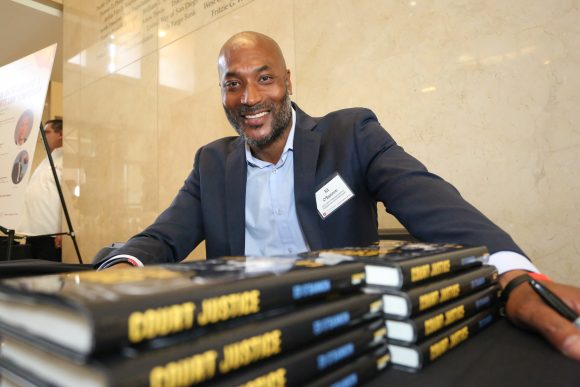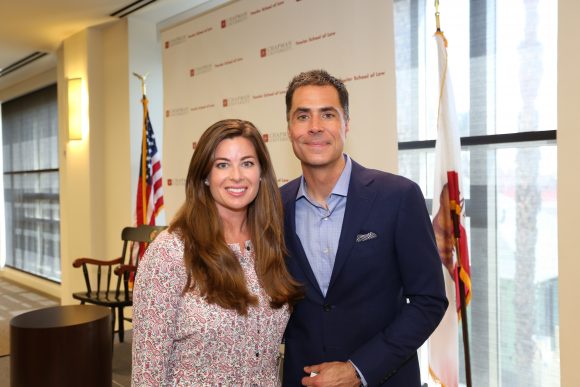The path that leads to the office of the general manager of the Los Angeles Lakers is not one that anyone could plot or plan. That includes Rob Pelinka, the man who sits behind the desk.
“There are 30 GMs in the world in the NBA. So 30 divided by the number of people in the universe, that’s a pretty low number,” the Lakers GM told about 180 law students and practicing attorneys March 30 at the Dale E. Fowler School of Law’s 2018 Entertainment and Sports Law Symposium.
“My commitment was always to the ‘excellence of the now,’” Pelinka said as he described his unconventional path to the front office in a keynote conversation with Fowler School of Law Dean Matt Parlow.
“It wasn’t, ‘I want to be the GM of the Lakers in 20 years, how do I get there?’ That’s a really low probability. But I think excellence in the now is a 100 percent possibility,” Pelinka said.
A Road From the Final Four to Law School
A former college basketball player who participated in three Final Fours and played with the Fab Five – he was wearing his 1989 Michigan NCAA championship ring as his alma mater readied for the 2018 Final Four – Pelinka went on to graduate cum laude from the University of Michigan Law School. He had no plans to become a sports agent and ended up representing Kobe Bryant. He had no plans to become a team executive and ended up as GM of one of sports’ most storied and valuable franchises, an organization Forbes estimated is worth $3 billion.
Pelinka credits his accomplishments to a series of mentors that began with his parents, recalling a time as a boy when his father took him to the welding shop at the high school where he taught and fashioned a small iron basketball hoop for his son.
“I remember him putting on the welding mask, sparks flying, I can still smell the room and remember that moment he brought that thing home, because he had invested so much time in making it,” Pelinka recalled. “He and my mom, they both said if you build your life around academic excellence and strong faith, and basketball and sports, you might see good things start happening.”
Once occupied largely by former players and coaches, the top front-office jobs in sports have become increasingly professionalized as athletes’ salaries and franchise values have soared. Like Pelinka, Golden State Warriors GM Bob Myers is an attorney and former agent. In Major League Baseball, Ivy League graduates moved into front offices as the influence of analytics spread, and in Chicago, both Cubs President of Baseball Operations Theo Epstein and White Sox GM Rick Hahn have law degrees and Ivy League backgrounds.
Hard Work and the Human Element
In his talk, Pelinka stressed that his job involves much more than putting a team on the floor.
“You think it’s trades and salary cap and signing players,” he said. “When you’re managing a team of 100 people and helping with a brand, there’s hours and hours of meetings every day.”
Joking that the NBA’s Collective Bargaining Agreement “is something ready to put you to sleep like the tax code, it’s 400 or 500 pages,” Pelinka also addressed the importance of crafting contracts and trades that work for both sides, an important aspect in any negotiation or mediation.
“If it’s 99 percent favorable to one team and one percent favorable to the other, it’s not happening. When you get close to 50-50, that’s where most trades happen,” he said.

Fowler Dean Matt Parlow, left, and Lakers General Manager Rob Pelinka
Working closely with Lakers great Magic Johnson, the club’s president of basketball operations, Pelinka put together a deal in February that brought the Lakers two-time All-Star Isaiah Thomas, Channing Frye and a 2018 first-round draft pick for Jordan Clarkson and Larry Nance Jr., and improved the team’s salary-cap flexibility in the process.
Amid the exhilaration of getting the deal done, Pelinka said, came “a deep kick in the gut” at trading away two players he liked.
“There’s a human element,” Pelinka said. “Many of you may think of players like assets. That’s not the case at all. You really get to know these guys.”
As an agent, being able to support a young player in crisis under the burden of financial difficulty and sudden fame was as memorable as jetting to China or Hong Kong with Bryant, Pelinka said.
“Being there in the moment like that… going through a hard time with a player and feeling like a mentor, a brother standing shoulder to shoulder, that’s probably what I remember most in those 20 years,” Pelinka said.
The way he handled himself across the negotiating table from the Lakers and in competition with other agents ultimately allowed Pelinka to make the big leap that the 6-foot-6 guard had never planned.
He was meeting with Jeanie Buss, the controlling owner of the Lakers, as she discussed the search for a general manager, saying she wanted someone with a legal mind, someone who was organized, understood trades and could help Johnson.
“She looked up and said, ‘Someone like you,’” Pelinka said. “It was a thunderbolt moment. That’s what really started the process.”
2018 Entertainment and Sports Law Symposium
Co-sponsored by Chapman Athletics and the Chapman Entertainment and Sports Law Society, the conference was the Fowler School of Law’s fifth Entertainment and Sports Law Symposium. Lauren Fitzpatrick (JD ‘18), Lisa Hurns (JD ‘18) and Hallie Lindsey (JD ’19), worked closely with Parlow, Fowler alumni and others to organize the event.

Ed O’Bannon, the former UCLA star who challenged the NCAA
Other sessions included a panel on the legal rights of student-athletes featuring Ed O’Bannon, the member of the 1995 UCLA national championship basketball team who sued the NCAA on behalf of athletes in 2009 after seeing himself depicted in an EA Sports video game without consent or compensation.
A federal judge ruled in O’Bannon’s favor in the class-action suit O’Bannon v. NCAA in 2014, saying the NCAA had violated antitrust laws in an unreasonable restraint of trade by limiting what college football and men’s basketball players could receive for playing sports. The U.S. Court of Appeals for the Ninth Circuit upheld the decision in 2015, agreeing the NCAA must allow schools to provide the “full cost of attendance,” enhancing food and housing allowances, but reversing a provision for cash compensation of up to $5,000 per year. Both sides appealed to the U.S. Supreme Court, which declined to hear the case. (Electronic Arts, the maker of the video game, reached a settlement with players, making one-time payments that averaged $1,600 to about 25,000 players.)
O’Bannon, who was thanked by several athletes during the symposium, remained afterward to sign copies of his recent book, “Court Justice: The Inside Story of My Battle Against the NCAA.”
A session on Representing the Professional Athlete packed a lecture hall with students possibly interested in becoming sports agents. Commenting candidly on their positive and negative experiences with agents were retired Major League Baseball player Adam Kennedy, retired NBA players Derek Anderson and O’Bannon as well as former Golden State Warrior Festus Ezeli, who is attempting to come back from injuries, and retired NFL players Gregory Camarillo, Geoff Schwartz and Jacques McClendon along with current Indianapolis Colt Jermaine Grace. The panel was moderated by attorney Alicia Jessop (JD ’09), an assistant professor at Pepperdine University and sports journalist.
Panelists joining O’Bannon during the session on legal protections for student-athletes were Ramogi Huma, executive director of the National College Players Association; attorney Melissa Maxman, a partner in the firm Cohen & Gresser; Amy P. Perko, CEO of the Knight Commission on Intercollegiate Athletics; and Jason Setchen, an attorney who represents high school and college athletes. The morning panel on Virtual Reality in the Sports featured Michael Casale, Ph.D., chief science officer, STRIVR; Kristy Gale, founder and CEO of Hypergolic; Andrew Hale, senior counsel, NextVR; Jonathan Lowe, senior vice president, AEG sports; and Rob Zuer, vice president, Denver Nuggets. It was moderated by Fowler Law professor Kathy Heller.
Featured image at top/Fowler School of Law Dean Matt Parlow, left, with Lakers General Manager Rob Pelinka


 “To see multiple law schools, organizations and individuals being recognized was quite amazing,” said Takeda Flaig. “Having a wider range of backgrounds and perspectives in the legal community increases access to justice for an increasingly diverse population. It makes us hopeful for the future of what the legal profession is going to look like.”
“To see multiple law schools, organizations and individuals being recognized was quite amazing,” said Takeda Flaig. “Having a wider range of backgrounds and perspectives in the legal community increases access to justice for an increasingly diverse population. It makes us hopeful for the future of what the legal profession is going to look like.”


